Papers by Dr. Jude C Nwaulune
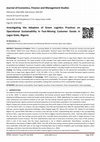
Journal of Economics, Finance and Management Studies, 2024
There is a growing debate on sustainability challenges among fast-moving consumer goods firms (FM... more There is a growing debate on sustainability challenges among fast-moving consumer goods firms (FMCG). FMCG firms value efficiency and sustainability. Research shows that FMCG firms are unsustainable owing to inadequate green logistics practices. Many studies focused on non-FMCG companies and industrialised countries, not emerging ones. Methodology: The green logistics and operational sustainability of chosen FMCG firms in Lagos State, Nigeria, were examined. The study was survey-based. The study included 13,782 managers from eight publicly listed FMCG businesses in Lagos State, Nigeria. The Taro Yamane formula determined the 519 sample size. Basic random sampling was utilised. The questionnaire was standardised and validated. Constructs' Cronbach's alpha reliability coefficients ranged from 0.78 to 0.94. The response rate was 96.7%. The data were examined using descriptive and inferential statistics, including multiple and hierarchical regression. Findings: The findings revealed that green logistics practices had significant effect on the operational sustainability of selected FMCG firms in Lagos State, Nigeria (Adj.R 2 = 0.02, F(5, 496) = 3.31, p < 0.05). The study concluded that green logistics practices promote operational sustainability of selected FMCG firms in Lagos State, Nigeria. Recommendations and Contribution to Knowledge: FMCG enterprises in Lagos State, Nigeria can integrate green logistics techniques into their sustainability plan to improve long-term sustainability. The research suggests that green logistics techniques may considerably enhance operational sustainability, making them essential to a firm's sustainability strategies.
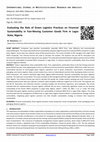
INTERNATIONAL JOURNAL OF MULTIDISCIPLINARY RESEARCH AND ANALYSIS, 2024
Companies now prioritise sustainability, especially FMCG firms, have efficiency and environmental... more Companies now prioritise sustainability, especially FMCG firms, have efficiency and environmental responsibility goals. This study examined financial sustainability and green logistics practices of selected FMCG companies in Lagos State, Nigeria. Survey data was collected using verified questionnaires. The survey included 13,782 managers from eight listed FMCG companies. Taro Yamane formula was used to calculate 519 samples. The response rate was 96.7%. Descriptive and inferential (multiple and hierarchical regression) was applied. This study demonstrated that green logistics practices did not affect the financial sustainability of selected FMCG companies in Lagos State. To improve long-term sustainability, these firms should use green logistical methods. ABSTRACT: Today's organisations value sustainability more. Thus, organisations, particularly those in the fast-moving consumer goods (FMCG) business, have aligned goals to focus on efficiency and environmental responsibility. FMCG firms suffer from nonsustainability because of mismanaged green logistics operations such as green production, procurement, transportation, packaging, and reverse logistics. Many current studies focus more on industrialised countries than developing nations and non-FMCG businesses. This research examined Lagos State, Nigeria FMCG businesses' financial sustainability and green logistical practices. The study was survey-based. The survey included 13,782 managerial staff from eight listed FMCG corporations in Lagos State, Nigeria. Taro Yamane formula was used to calculate 519 sample size. Simple random sampling was used. Structured and validated questionnaires data was collected. Cronbach's alpha reliability coefficient ranged from 0.78 to 0.94. The response rate was 96.7%. Descriptive and inferential statistics, including multiple and hierarchical regression, were employed. The results indicated that the implementation of green logistics methods did not have a statistically significant impact on the financial sustainability of the chosen FMCG companies in Lagos State, Nigeria. (Adj.R 2 = 0.001, F(5, 496) = 1.11, p > 0.05). The study concluded that green logistics practices promote firm sustainability of selected FMCG firms in Lagos State, Nigeria. This study recommended that the management of FMCG firms in Lagos State, Nigeria should embrace a comprehensive strategy towards sustainability, integrating green logistics practices into their broader sustainability strategy to enhance their long-term sustainability.
This article explores the synergy between philosophy, corporate finance, and corporate social res... more This article explores the synergy between philosophy, corporate finance, and corporate social responsibility (CSR), emphasizing the importance of interdisciplinarity in addressing the complex ethical, social, and environmental challenges faced by organizations today. By integrating the teachings of philosophy and ethical theories, companies can enrich their understanding and practice of ethical corporate finance and CSR, developing conceptual frameworks, critical thinking skills, and systematic approaches for ethical decisionmaking and problem-solving. Companies that adopt ethical and responsible practices can promote value creation for stakeholders, financial performance, and long-term sustainability, thereby contributing to the achievement of sustainable development goals and the creation of a more just, sustainable, and responsible world.
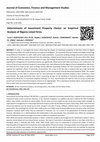
Journal of Economics, Finance and Management Studies, 2024
In order to investigate the factors influencing the choices of investment properties of the firms... more In order to investigate the factors influencing the choices of investment properties of the firms listed on Nigeria Exchange Group (NGX), this study carried out an empirical investigation. 155 businesses that were listed on the Nigerian Exchange Group (NGX) as of December 31, 2022, made up the study's population. A purposive sampling strategy was used to select a sample size of fifty-five firms. Data were obtained from the companies' audited annual financial reports for the years 2012-2022. Panel data regression (PDR) was utilized for the analysis of data. The findings showed that the accounting choices made by businesses regarding the management of investment property are significantly influenced by both debt and business size. Furthermore, the choice of how to treat investment property in accounting is not much influenced by the degree of board independence. Moreover, non-financial firms listed on the stock exchange choose different accounting methods for their investment assets due to the negative and significant effects of ownership concentration. This is due to the fact that a company that has a high ownership concentration is less likely to base its accounting choices on the International Financial Reporting Standards (IFRS). This implies that businesses are less likely to adhere to the fair value technique for valuing investment property if their ownership is more concentrated. The study discovered that a firm's accounting decision on the handling of investment property is significantly influenced by the drivers of investment property choosing. It is, thus, recommended the need for firms to set up a system that would track and assess investment property choices on an ongoing basis. This is expected to develop robust, and proactive plans that consider both short-term financial gain and long-term viability.
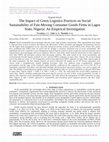
IRJEMS International Research Journal of Economics and Management Studies, 2023
Social sustainability has increasingly taken the centre stage of today's organisation. Thus, orga... more Social sustainability has increasingly taken the centre stage of today's organisation. Thus, organisations have begun to align priorities to focus on factors that improve the effectiveness of their operations and integrate environmental concerns into the supply chain management system, especially among fast moving consumer goods (FMCG) firms. Despite this, studies have established that FMCG firms are faced with the struggle to maintain substantial level of social sustainability. This impediment has been created due to poor management of green logistics practices (green production, green procurement, green transportation, green packaging, and reverse logistics). However, most of the extant researches focus more on other industries other than FMCG and developed countries than developing countries. This study looked on the social sustainability and environmentally friendly logistics methods of a few selected FMCG companies in Lagos State, Nigeria. The research design used in the study was survey. 13,782 management workers from eight listed FMCG companies in Lagos State, Nigeria made up the study's population. The Taro Yamane formula was used to determine the sample size of 519. Survey respondents were chosen using a straightforward random sampling procedure. Data were gathered using a standardized, validated questionnaire, and the range of the Cronbach's alpha reliability coefficient for the components was 0.78 to 0.94. 96.7% of respondents responded. Descriptive and inferential (multiple and hierarchical regression) statistics were used to analyse the data. The findings revealed that green logistics practices had significant effect on social sustainability of selected FMCG firms in Lagos State, Nigeria (Adj.R 2 = 0.066, F (5, 496) = 8.036, p < 0.05). The study found that certain FMCG companies in Lagos State, Nigeria, benefited significantly from green logistics practises in terms of their social sustainability. In order to improve their long-term social sustainability performance, this study advised the management of FMCG enterprises in Lagos State, Nigeria, to take a holistic approach to sustainability and incorporate green logistical practises into their larger sustainability plan.
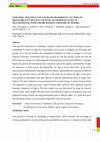
Intercienci Journl, 2023
Sales growth is important for expanding a company's market presence and increasing its revenue, p... more Sales growth is important for expanding a company's market presence and increasing its revenue, profitability is crucial for long-term sustainability and success. A company can have high sales growth, but it may not translate into sustainable profitability if it fails to manage its costs and expenses effectively. Profitability takes into account not only the top-line revenue but also the bottom-line net income. It's worth noting that balancing sales growth and profitability is essential. Rapid sales growth can be beneficial, but it should not come at the expense of profitability. Despite the importance of sales growth and profitability, the area in which future shifts in the macro environment in multinational corporations used to identify opportunities for expansion to different regions, has not been covered. The objective of this study was to explore the effect of the macro environment on profitability and sales growth in selected multinational firms in Ogun State, Nigeria. The study employed a cross-sectional survey research design. A survey research design was employed to conduct the study, which involved 2266 staff from three important food and beverage companies in Nigeria. The total sample size was determined by using the research advisors table, which yielded 329 participants from the entire sample of respondents. Data were gathered by using a reliable and valid questionnaire with a Cronbach's alpha > 0.7. Both descriptive and inferential statistics were calculated using SPSS version 26 software.
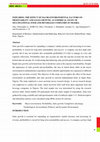
Sales growth is important for expanding a company's market presence and increasing its revenue, p... more Sales growth is important for expanding a company's market presence and increasing its revenue, profitability is crucial for long-term sustainability and success. A company can have high sales growth, but it may not translate into sustainable profitability if it fails to manage its costs and expenses effectively. Profitability takes into account not only the top-line revenue but also the bottom-line net income. It's worth noting that balancing sales growth and profitability is essential. Rapid sales growth can be beneficial, but it should not come at the expense of profitability. Despite the importance of sales growth and profitability, the area in which future shifts in the macro environment in multinational corporations used to identify opportunities for expansion to different regions, has not been covered. The objective of this study was to explore the effect of the macro environment on profitability and sales growth in selected multinational firms in Ogun State, Nigeria. The study employed a cross-sectional survey research design. A survey research design was employed to conduct the study, which involved 2266 staff from three important food and beverage companies in Nigeria. The total sample size was determined by using the research advisors table, which yielded 329 participants from the entire sample of respondents. Data were gathered by using a reliable and valid questionnaire with a Cronbach's alpha > 0.7. Both descriptive and inferential statistics were calculated using SPSS version 26 software.
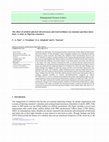
Management Science Letters, 2019
Celebrities are individuals who are popular in public arena because of their physical attractiven... more Celebrities are individuals who are popular in public arena because of their physical attractiveness and trustworthiness. To take advantage of these components, marketers use celebrities for product promotion to create awareness and enhance the credibility of their advertisement. However, the use of celebrities to endorse consumer products by the Nigerian telecommunication industry led to huge cost of acquiring physically attractive endorsers and lack of celebrity trust because customers perceived that the celebrities were paid to feature in the brand and not necessarily, they believed in the brand. This study, therefore, examined the effect of celebrity physical attractiveness and trustworthiness on consumer purchase intentions of selected telecommunication in Nigeria. Survey design was employed and a target population of 519 students was used in the study. Random sampling technique was adopted to select the sample size and a well-structured questionnaire was adopted for the study....
Thesis Chapters by Dr. Jude C Nwaulune
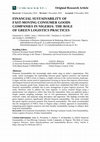
Asian Interdisciplinary and Sustainability Review, 14(1),, 2024
Financial Sustainability has increasingly taken center stage in today's organizations. This study... more Financial Sustainability has increasingly taken center stage in today's organizations. This study, which investigates the relationship between green logistics practices and financial sustainability in FMCG firms in Nigeria, is highly relevant in the current business landscape. It aligns with the current trend of organizations focusing on factors that improve effectiveness and integrate financial and environmental concerns into their operations, especially among fastmoving consumer goods firms. Despite this, studies have established that FMCG firms face financial sustainability, probably due to poor management of green logistics practices. The study, therefore, aims to address this issue urgently. A survey research design using a questionnaire was adopted to collect data from the respondents. Data was gathered using a simple random sampling technique. Out of 519 questionnaires administered, 502 were retrieved, coded, and analyzed using descriptive and regression. The findings revealed that green logistics practices significantly affected financial sustainability. The study concluded that green logistics practices promote firm financial sustainability. This study recommended that the management of FMCG firms in Nigeria adopt a holistic approach to sustainability, integrating green logistics practices into their broader sustainability strategy to enhance their long-term sustainability.
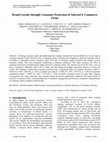
WSEAS TRANSACTIONS on BUSINESS and ECONOMICS , 2024
Ensuring consumer rights and addressing their various concerns has been identified as a crucial ... more Ensuring consumer rights and addressing their various concerns has been identified as a crucial step in securing customer loyalty. However, the e-commerce sector in Nigeria has struggled to retain its customers due to
its failure to adequately protect consumer rights. This lack of consumer rights protection has resulted in poor customer loyalty, with users frequently abandoning e-commerce platforms. This study examines the effect of consumer protection on brand loyalty within selected e-commerce firms. The research surveyed 497 active users of
these e-commerce platforms with a 90.3% return rate and employed multiple regression analysis to assess the results. The findings revealed that consumer protection has a significant effect on purchase decisions (Adj.R² = 0.660, F(3, 445) = 290.639, p < 0.05), customer trust (Adj.R² = 0.580, F(3, 445) = 207.126, p < 0.05) and customer satisfaction (Adj.R² = 0.590, F(3, 445) = 215.819, p < 0.05) of listed e-commerce firms in Lagos State, Nigeria.
Consequently, the study concludes that consumer brand protection significantly influences the brand loyalty of selected e-commerce firms, recommending that e-commerce management prioritize the recognition and protection of consumer rights to enhance brand loyalty.
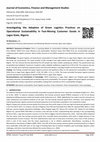
Journal of Economics, Finance and Management Studies, 2024
There is a growing debate on sustainability challenges among fast-moving consumer goods firms (FM... more There is a growing debate on sustainability challenges among fast-moving consumer goods firms (FMCG). FMCG firms value efficiency and sustainability. Research shows that FMCG firms are unsustainable owing to inadequate green logistics practices. Many studies focused on non-FMCG companies and industrialised countries, not emerging ones. Methodology: The green logistics and operational sustainability of chosen FMCG firms in Lagos State, Nigeria, were examined. The study was survey-based. The study included 13,782 managers from eight publicly listed FMCG businesses in Lagos State, Nigeria. The Taro Yamane formula determined the 519 sample size. Basic random sampling was utilised. The questionnaire was standardised and validated. Constructs' Cronbach's alpha reliability coefficients ranged from 0.78 to 0.94. The response rate was 96.7%. The data were examined using descriptive and inferential statistics, including multiple and hierarchical regression. Findings: The findings revealed that green logistics practices had significant effect on the operational sustainability of selected FMCG firms in Lagos State, Nigeria (Adj.R 2 = 0.02, F(5, 496) = 3.31, p < 0.05). The study concluded that green logistics practices promote operational sustainability of selected FMCG firms in Lagos State, Nigeria. Recommendations and Contribution to Knowledge: FMCG enterprises in Lagos State, Nigeria can integrate green logistics techniques into their sustainability plan to improve long-term sustainability. The research suggests that green logistics techniques may considerably enhance operational sustainability, making them essential to a firm's sustainability strategies.
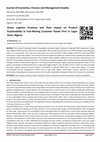
Journal of Economics, Finance and Management Studies, 2024
This research examined product sustainability and green logistics practices of selected FMCG ente... more This research examined product sustainability and green logistics practices of selected FMCG enterprises in Lagos State, Nigeria. FMCGs prioritize efficiency and sustainability. Many studies have focused on non-FMCG enterprises and developed nations, not rising nations. This study was survey-based. This survey included 13,782 managerial staff from eight listed FMCG corporations in Lagos State, Nigeria. Taro Yamane formula calculated 519 sample size. Simple random sampling was utilized. Data was collected using a validated questionnaire. The Cronbach's alpha reliability coefficient for the constructs varied between 0.78 and 0.94. The percentage of response was 96.7%. The data were analyzed using descriptive statistics as well as inferential statistics, including multiple and hierarchical regression. The findings revealed that green logistics practices had significant effect on the product sustainability of selected FMCG firms in Lagos State, Nigeria (Adj.R 2 = 0.03; F(5, 496) = 4.977, p < 0.05). The study concluded that green logistics practices promote product sustainability of selected FMCG firms in Lagos State, Nigeria. This study recommended that the management of FMCG firms in Lagos State, Nigeria should adopt a holistic approach to product sustainability, integrating green logistics practices into a broader sustainability strategy to enhance their long-term sustainability.










Uploads
Papers by Dr. Jude C Nwaulune
Thesis Chapters by Dr. Jude C Nwaulune
its failure to adequately protect consumer rights. This lack of consumer rights protection has resulted in poor customer loyalty, with users frequently abandoning e-commerce platforms. This study examines the effect of consumer protection on brand loyalty within selected e-commerce firms. The research surveyed 497 active users of
these e-commerce platforms with a 90.3% return rate and employed multiple regression analysis to assess the results. The findings revealed that consumer protection has a significant effect on purchase decisions (Adj.R² = 0.660, F(3, 445) = 290.639, p < 0.05), customer trust (Adj.R² = 0.580, F(3, 445) = 207.126, p < 0.05) and customer satisfaction (Adj.R² = 0.590, F(3, 445) = 215.819, p < 0.05) of listed e-commerce firms in Lagos State, Nigeria.
Consequently, the study concludes that consumer brand protection significantly influences the brand loyalty of selected e-commerce firms, recommending that e-commerce management prioritize the recognition and protection of consumer rights to enhance brand loyalty.
its failure to adequately protect consumer rights. This lack of consumer rights protection has resulted in poor customer loyalty, with users frequently abandoning e-commerce platforms. This study examines the effect of consumer protection on brand loyalty within selected e-commerce firms. The research surveyed 497 active users of
these e-commerce platforms with a 90.3% return rate and employed multiple regression analysis to assess the results. The findings revealed that consumer protection has a significant effect on purchase decisions (Adj.R² = 0.660, F(3, 445) = 290.639, p < 0.05), customer trust (Adj.R² = 0.580, F(3, 445) = 207.126, p < 0.05) and customer satisfaction (Adj.R² = 0.590, F(3, 445) = 215.819, p < 0.05) of listed e-commerce firms in Lagos State, Nigeria.
Consequently, the study concludes that consumer brand protection significantly influences the brand loyalty of selected e-commerce firms, recommending that e-commerce management prioritize the recognition and protection of consumer rights to enhance brand loyalty.